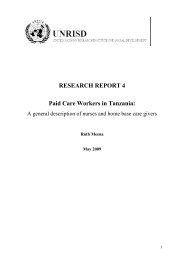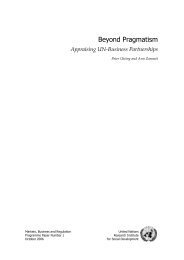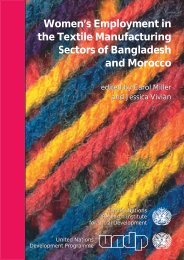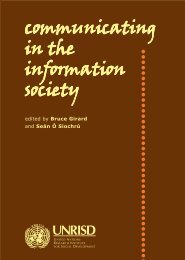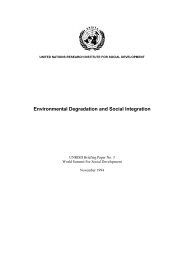The Politics of Gender and Reconstruction in Afghanistan
The Politics of Gender and Reconstruction in Afghanistan
The Politics of Gender and Reconstruction in Afghanistan
You also want an ePaper? Increase the reach of your titles
YUMPU automatically turns print PDFs into web optimized ePapers that Google loves.
CONCLUSION • BIBLIOGRAPHY<br />
bibliography<br />
Abu-Lughod, Lila. 2002. “Do Muslim women really need sav<strong>in</strong>g? Anthropological reflections on cultural relativism<br />
<strong>and</strong> its others.” American Anthropologist, Vol. 104, No. 3, pp. 1–8.<br />
ACSF/swisspeace. 2003. Report on “Technical lessons learned from the Afghan Civil Society Forum<br />
(ACSF)/swisspeace civic education for the constitution project.” ACSF/swisspeace, Kabul.<br />
Amnesty International. 2003. <strong>Afghanistan</strong>. “No-one listens to us <strong>and</strong> no-one treats us as human be<strong>in</strong>gs”: Justice<br />
denied to women. www.web.amnesty.org/library/<strong>in</strong>dex/engasa110232003, accessed on 6 October 2003.<br />
Arat-Koc, Sedef. 2002. “Imperial wars or benevolent <strong>in</strong>terventions? Reflections on ‘global fem<strong>in</strong>ism’ post<br />
September 11th.” Atlantis, Vol. 26, No. 2. www.mun.ca/fkn/Journals/atlantis/satlantisissue26.2.htm, accessed<br />
on 21 November 2002.<br />
Asia Foundation. 2004. Voter education plann<strong>in</strong>g survey: <strong>Afghanistan</strong> 2004. National elections: A report based on a<br />
public op<strong>in</strong>ion poll. www.asiafoundation.org/pdf/afghan_voter-ed04.pdf, accessed on 21 December 2004.<br />
Azarbaijani-Moghaddam, Sippi. 2004. “Afghan women on the marg<strong>in</strong>s <strong>of</strong> the twenty first century.” In Antonio<br />
Don<strong>in</strong>i, Norah Nil<strong>and</strong> <strong>and</strong> Kar<strong>in</strong> Wermester (eds.), Nation-build<strong>in</strong>g Unraveled? Aid, Peace <strong>and</strong> Justice <strong>in</strong><br />
<strong>Afghanistan</strong>. Kumarian Press, Bloomfield, Conn.<br />
Azarbaijani-Moghaddam, Sippi. 2003. Includ<strong>in</strong>g marg<strong>in</strong>alized groups <strong>in</strong> the legal system: State reconstruction <strong>and</strong><br />
<strong>in</strong>ternational engagement <strong>in</strong> <strong>Afghanistan</strong>. Paper presented at the Symposium on State <strong>Reconstruction</strong> <strong>and</strong><br />
International Engagement <strong>in</strong> <strong>Afghanistan</strong>, Centre for Development Research, Bonn, 30 May to 1 June.<br />
Azarbaijani-Moghaddam, Sippi. 2001. Report on <strong>in</strong>terviews with returnee women <strong>and</strong> girls <strong>in</strong> Herat Prov<strong>in</strong>ce,<br />
<strong>Afghanistan</strong>. Women’s Commission for Refugee Women <strong>and</strong> Children, Kabul.<br />
Barakat, Sultan <strong>and</strong> Gareth Wardell. 2002. “Exploited by whom: An alternative perspective on humanitarian<br />
assistance to Afghan women.” Third World Quarterly, Vol. 23, No. 5, pp. 909–930.<br />
Barfield, Thomas. 2003. Afghan Customary Law <strong>and</strong> its Relationship to Formal Judicial Institutions. United States<br />
Institute for Peace, Wash<strong>in</strong>gton, D.C.<br />
Bhatia, Michael <strong>and</strong> Jonathan Goodh<strong>and</strong>, with H. Atmar, A. Pa<strong>in</strong> <strong>and</strong> M. Suleman. 2003. “Pr<strong>of</strong>its <strong>and</strong> poverty:<br />
Aid livelihoods <strong>and</strong> conflict <strong>in</strong> <strong>Afghanistan</strong>.” In Sarah Coll<strong>in</strong>son (ed.), Power, Livelihoods <strong>and</strong> Conflict: Case<br />
Studies <strong>in</strong> Political Economy Analysis for Humanitarian Action, HPG Report 13, pp. 67–90. Humanitarian<br />
Policy Group, London.<br />
Bill, Heike. 2002. “Country without a state: Does it really make a difference for the women?” In Christ<strong>in</strong>e<br />
Noelle-Karimi, Conrad Schetter <strong>and</strong> Re<strong>in</strong>hard Schlag<strong>in</strong>tweit (eds.), <strong>Afghanistan</strong>: A Country without a State?<br />
IKO Verlag fur Interkulturelle Kommunikation, Frankfurt <strong>and</strong> London.<br />
Boesen, Inger. 2004. “From subjects to citizens: Local participation <strong>in</strong> the National Solidarity Programme.”<br />
AREU Work<strong>in</strong>g Paper Series, Kabul.<br />
<strong>The</strong> Bonn Agreement. 2001. Agreement on Provisional Arrangements <strong>in</strong> <strong>Afghanistan</strong> Pend<strong>in</strong>g the Re-Establishment<br />
<strong>of</strong> Permanent Governmental Institutions. Bonn. http://www.unama-afg.org/docs/ bonn/bonn.html, accessed<br />
on 5 January 2005.<br />
Bourdieu, Pierre. 1977. An Outl<strong>in</strong>e <strong>of</strong> a <strong>The</strong>ory <strong>of</strong> Practice. Cambridge University Press, Cambridge.<br />
Care International <strong>and</strong> the Center on International Cooperation. 2004. “<strong>The</strong> cost <strong>of</strong> do<strong>in</strong>g too little.”<br />
<strong>Afghanistan</strong> Policy Brief. www.care<strong>in</strong>ternational.org.uk/cares_work/where/afghanistan/media_release/<br />
cic_brief_f<strong>in</strong>al.pdf, accessed on 21 December 2004.<br />
Carl<strong>in</strong>, Ann. 2003. Rush to Reengagement <strong>in</strong> <strong>Afghanistan</strong>: <strong>The</strong> IFI’s Post-conflict Agenda with a Special Focus on the<br />
National Solidarity Program. World Bank Information Center, Wash<strong>in</strong>gton, D.C.<br />
PAGE 33




